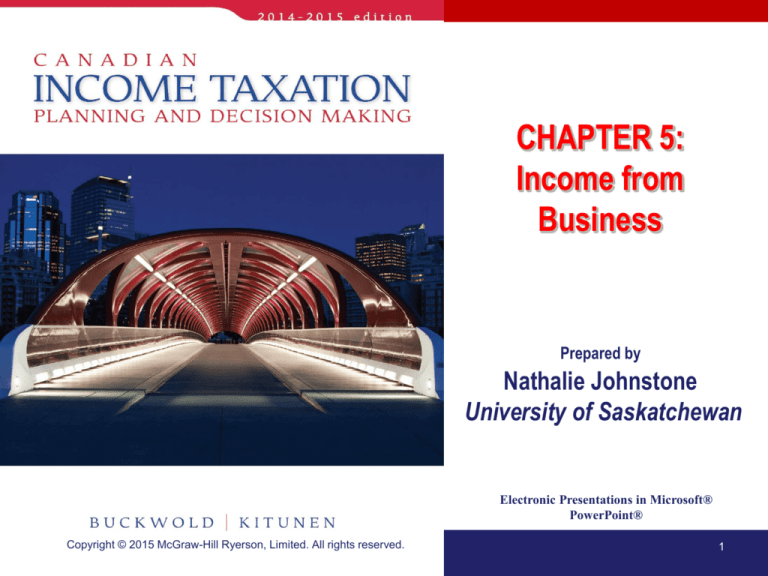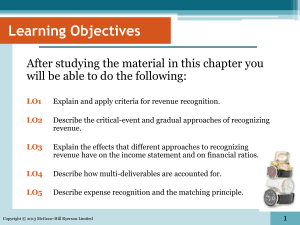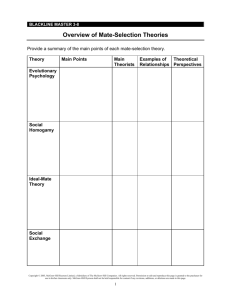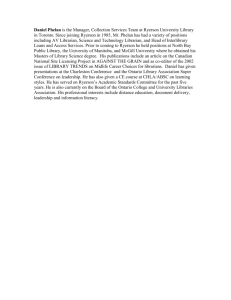
CHAPTER 5:
Income from
Business
Prepared by
Nathalie Johnstone
University of Saskatchewan
Electronic Presentations in Microsoft®
PowerPoint®
Copyright © 2015 McGraw-Hill Ryerson, Limited. All rights reserved.
1
Income from Business
Business Income VS Capital Gain
II. General Rules for Determining
Business Income
III. Exceptions to the General Rules
I.
Copyright © 2015 McGraw-Hill Ryerson, Limited. All rights reserved.
2
1. Business Income versus Capital
[did you intend to flip it and make profit? Show that
you went to the trouble and tried to market it]
Depending on the reason for acquisition & use:
the gain or loss on the sale can be either:
a business activity or
a capital transaction.
Distinction between the two sources is important:
Capital transaction have preferential treatment.
Business income fully taxable.
Business losses can offset other income.
Copyright © 2015 McGraw-Hill Ryerson, Limited. All rights reserved.
3
Intended Use
Capital treatment can be distinguished from business treatment by
employing the following guidelines:
Acquired for
Long-term
Benefit
Capital
treatment
X
Acquired for
resale
Business
treatment
Sometimes difficult to determine primary
intention.
Copyright © 2015 McGraw-Hill Ryerson, Limited. All rights reserved.
4
II. General Rules for Determining Business Income
• Business income for tax purposes is the profit from the business.
GAAP is good starting point – adjustments are made when certain
items are treated differently for tax purposes.
Net Income per F/S ( GAAP)
Add:
• Income excluded from accounting income
• Non-deductible expenses
• Unreasonable amounts
• Taxable capital gains
Deduct:
• S. 20 expenses specifically allowed
Net income from a business for tax purposes
Copyright © 2015 McGraw-Hill Ryerson, Limited. All rights reserved.
XXX
XXX
XXX
XXX
XXX
XXX
(XXX)
XXX
5
General Limitations to Business Profit
Determination
Expenses are deductible only if the following conditions are
met: [need to pass all of them]
1.
2.
3.
4.
5.
6.
ITA 18(1)(a) - Income Earning Purpose Test.
ITA 18(1)(b) - Capital Test. [capital expense – claim depreciation]
ITA 18(1)(c) - Exempt Income Test. [only charities]
ITA 18(1)(e) - Reserve Test. [reserve for AFDA from AR]
ITA 18(1)(h) Personal Expense Test. []most common cause of failing]
ITA 67 - Reasonableness Test.
Copyright © 2015 McGraw-Hill Ryerson, Limited. All rights reserved.
6
1. Income Earning Purpose Test
• Must be incurred for the purpose of gaining, producing, or
maintaining income from business.
• Expenses incurred in carrying
on a business activity with an
expectation to profit.
• Primary test for the deductibility of expenses.
Copyright © 2015 McGraw-Hill Ryerson, Limited. All rights reserved.
7
2. Capital Test
• Cannot deduct items of capital nature.
– long-term or enduring benefit.
• Main reason for limiting expenditures of capital nature:
– Remove flexibility and estimates.
– Can deduct using uniform system – Capital Cost Allowance
(“CCA”).
Copyright © 2015 McGraw-Hill Ryerson, Limited. All rights reserved.
8
3. Exempt Income Test
• An expense is not deductible even though it was
incurred to earn income, if the income that is expected to
be generated is itself not taxable revenue.
Copyright © 2015 McGraw-Hill Ryerson, Limited. All rights reserved.
9
4. Reserve Test
• No reserves are deductible for tax purposes.
• However, exceptions are permitted.
Copyright © 2015 McGraw-Hill Ryerson, Limited. All rights reserved.
10
5. Personal Expense Test
• No deductions are permitted for a taxpayer’s personal or
living expenses except for those travel expenses incurred
away from home in the course of carrying on business.
Copyright © 2015 McGraw-Hill Ryerson, Limited. All rights reserved.
11
6. Reasonableness Test
• An outlay or expense is deductible only if reasonable in
the circumstances.
• Even if meets the other general criteria for deductibility,
still subject to the reasonability test.
• Designed to combat Abuse and confine business
expenses to those incurred in the income-earning
process.
Copyright © 2015 McGraw-Hill Ryerson, Limited. All rights reserved.
12
Expenses Denied
ITA 18(1)(l) - Use of recreational facilities and club dues
• No deduction permitted for the use or maintenance of
a yacht, a camp, a lodge, or a golf course, unless part
of normal business.
• Also denies all expenses incurred as membership
fees or dues in any club.
ITA 18(1)(n) - Political contributions
• No political contributions are deductible by companies
ITA 19 - Advertising Expenses [Why would you hire a
foreigner to advertise to Canadians – want to encourage
local use]
• Advertising in a non-Canadian newspaper or
broadcasting undertaking cannot be deducted if the
advertising is directed primarily at a Canadian
Copyright © 2015 McGraw-Hill Ryerson, Limited. All rights reserved.
market.
13
Expenses Denied
ITA 18(1)(r) - Allowance for an Automobile
• Limits the allowable amount to the prescribed amount.
• Maximum Allowance that can be deducted by an employer
is $0.54 for first 5,000 km, and $0.48 for each additional km.
• Limitation applies only allowance is tax-free.
• If allowance is taxable, the employer can deduct the full
amount, provided that it is reasonable.
Copyright © 2015 McGraw-Hill Ryerson, Limited. All rights reserved.
14
Expenses Denied
[need to capitalize costs – only claim against profit at sale]
Interest and property taxes on idle land:
• Land is idle if:
• it is vacant and is not being used to generate income, or
• if it is being held primarily for resale or development.
• Related interest costs and property taxes are deductible
• to the extent that income is generated from that land- ITA 18(2),(3).
• Any unused balance is added to the cost of the land
• the amount initially denied can be deducted against the sale proceeds when sold ITA
53(1)(h),10(1.1).
Copyright © 2015 McGraw-Hill Ryerson, Limited. All rights reserved.
15
Expenses Denied
ITA 18(3.1)-(3.7) Soft Costs - Certain costs during construction
period
•
•
•
•
•
Legal and accounting fees,
Interest costs,
Mortgage costs,
Property taxes, and
Promotional expenses
that relate to the construction project.
• Costs are instead added to the cost of the building and deducted
through CCA.
Copyright © 2015 McGraw-Hill Ryerson, Limited. All rights reserved.
16
Expenses Denied
ITA 18(12) - Work space in home not permitted unless one of the
following conditions is met:
• The space is “the individual’s principal place of business.” or
• If first condition not met
• used exclusively for the purpose of earning income
from business, and
• used on a regular or continuous basis for meeting
clients, customers or patients of the individual.”
Copyright © 2015 McGraw-Hill Ryerson, Limited. All rights reserved.
17
Expenses Denied
Work space in home (continued)
• Permitted expenses include a proportionate amount of the
home’s common expenses:
• Maintenance cost (heating, home insurance, electricity,
cleaning material),
• Mortgage interest,
• Property taxes,
• Capital Cost Allowance
• Total expenses cannot exceed business income for the
year.
• Excess can be carried forward indefinitely.
Copyright © 2015 McGraw-Hill Ryerson, Limited. All rights reserved.
18
Expenses Denied
Meals and entertainment
• ITA 67.1 - Amount permitted is limited to 50% of actual
costs incurred.
• One of the exceptions (100% deduction):
cost of food, beverage, and entertainment events generally available to all
employees (limited to six “occasional events” per year).
Copyright © 2015 McGraw-Hill Ryerson, Limited. All rights reserved.
19
Expenses Denied
Costs of an automobile
– ITA 13(7)(g) - Cost for purposes of claiming a deduction for CCA cannot
exceed $30,000 (exclusive of any GST and PST).
– ITA 67.2 - The interest cost on money borrowed to acquire a vehicle
cannot exceed $300/month.
– ITA 67.3 - The deduction for a leased automobile cannot exceed
$800/month.
• Unpaid Remuneration
– Not deductible unless paid within 180 days after the business year end
– [claim deduction on balance sheet, put in as AP, if not paid within 180
days next year need to re-do statement and pay tax on it]
Copyright © 2015 McGraw-Hill Ryerson, Limited. All rights reserved.
20
Expenses Permitted
• Section 20 of the Act lists approximately 40 specific items that are
permitted as deductions even though, according to the six general
limitations, they do not normally qualify.
Copyright © 2015 McGraw-Hill Ryerson, Limited. All rights reserved.
21
Expenses Permitted
ITA 20(1)(c) - Interest
• Interest paid is generally deductible EXCEPT: interest paid
to CRA on late payments, interest paid on vacant land,
interest paid on personal loans (home mortgage, RRSPs)
ITA 20(1)(e) - Financing Expenses for business
• Permitted as a deduction – equally over five years.
• Include the cost of registering a mortgage, appraisal fees for
financing, selling commissions, and finder’s fees.
Copyright © 2015 McGraw-Hill Ryerson, Limited. All rights reserved.
22
Expenses Permitted
ITA 20(1)(l) - Reserves for doubtful debts and bad debt expense
• Can claim a reserve on amounts receivable if:
it is anticipated that they won’t be collected,
reserve is reasonable and
that the debt, when established, created income for the
taxpayer.
Copyright © 2015 McGraw-Hill Ryerson, Limited. All rights reserved.
23
Expenses Permitted
ITA 20(1)(cc) - Representation expenses:
• fully deductible.
• Can elect to deduct equally over 10 years.
ITA 20(1)(dd) - Site Investigation:
• Allowed even when site is not acquired.
ITA 20.01 - Private Health Services Plan:
• Deductible for all employee but limits to:
– $1,500 for owners and spouses,
– $750 per child.
ITA 20(1)(q) – Registered Pension Plans:
• Must be paid within 120 days of business year end
Copyright © 2015 McGraw-Hill Ryerson, Limited. All rights reserved.
24
Expenses Permitted
Expenses deductible on a cash basis
• Convention expenses - Limited to two conventions in a year.
• Landscaping
• Representation fees
• Site investigation fees
• Utility service connections
• Investment counsel fees
Copyright © 2015 McGraw-Hill Ryerson, Limited. All rights reserved.
25
Treatment of Inventories
• The Act permits closing inventory to be valued
using one of two methods:
1.
Value each item of inventory at lower of:
–
2.
Cost or Market -ITA 10(1).
Value all items of inventory at their market value – Reg. 1801.
• All inventory flow methods are acceptable
EXCEPT FIFO
• Must use the same valuation method from year to
year unless a change is approved by the CRA.
Copyright © 2015 McGraw-Hill Ryerson, Limited. All rights reserved.
26
Tax Planning Checklist
• The sale of property may be treated as a business or a capital
transaction. When acquiring property anticipate its tax treatment
and plan for the best possible outcome in the event the property is
sold
• Don’t forget the $$ restrictions on certain items when purchasing
or leasing (car cost for CCA-Max $30k, Lease cost $800/mth,
Interest on car loan $300/mth
• Identify expenses or revenue items where the company have
discretion as to when and how much to deduct or include in
income for tax purposes
–
–
–
–
CCA
SR+ED
Interest on money borrowed to acquire depreciable property
Allowable reserves
Copyright © 2015 McGraw-Hill Ryerson, Limited. All rights reserved.
27




